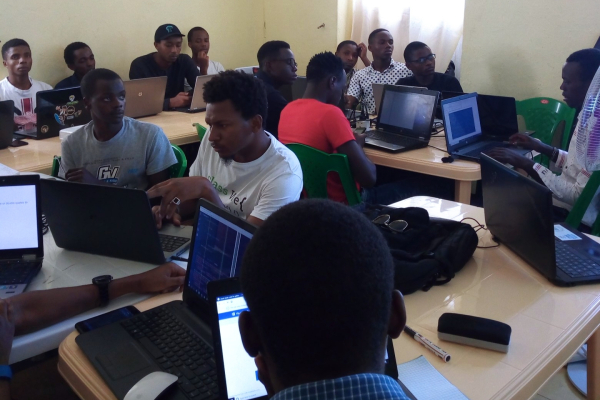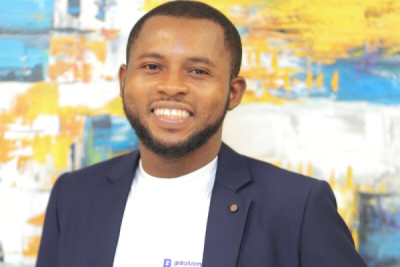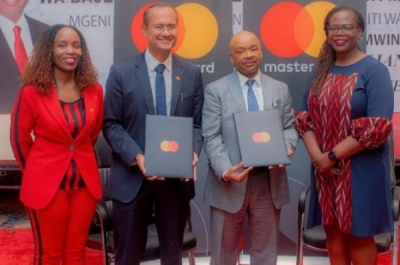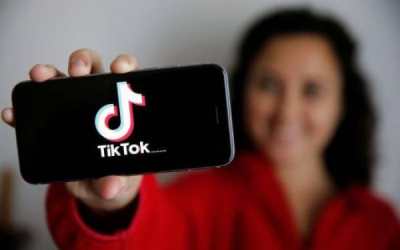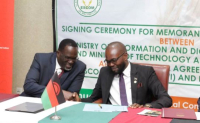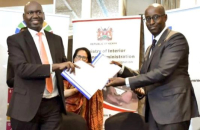Kenya: SwahiliBox encourages collaboration, learning, and the development of technological solutions
Through its technology-focused programs, training, and services, SwahiliBox stimulates local innovation and helps address the technological and social challenges facing the Kenyan and wider East African community.
Based in Mombasa, Kenya, SwahiliBox is a space dedicated to technology co-creation. It aims to empower people by stimulating innovation through networking, training, mentoring, and cooperation. The space brings together a diverse set of skills to share knowledge, concepts, and impactful solutions to local and global challenges.
Headed by Ahmed Mohamed Maawy, a seasoned tech professional and entrepreneur, SwahiliBox promotes creative thinking by creating a framework conducive to the emergence of innovative ideas and the design of innovative solutions. It organizes incubation programs for online entrepreneurs and also sets up acceleration programs during which it offers funding opportunities and strategic advice to start-ups wishing to expand.
Its comprehensive training courses cover a wide range of both technological and business topics. They equip learners with practical skills, sectoral expertise, and in-depth knowledge, enabling them to stand out in today's competitive environment.
In addition to its training, incubation, and acceleration initiatives, SwahiliBox also offers its software development and game design skills to companies. Its team has in-depth expertise in creating tailor-made solutions perfectly suited to the specific needs of every business.
The incubation center also provides data analysis solutions to enable companies to gain valuable business insights, make the right decisions, and optimize their processes for sustainable growth. It also offers UI/UX design and digital marketing services.
To date, SwahiliBox has completed 129 projects and satisfied 158 customers. Having built a community of 1,800 members, it has signed partnerships with several institutions and organizations, including TechBridge Invest, Ushahidi, The Indigo Trust, Seacom, iHub, Camara Education, X-TEAM, and Sote Hub.
Melchior Koba
The digital revolution emerges as a potent catalyst for development and progress worldwide. Nevertheless, it also unveils vulnerabilities that may present obstacles to advancement.
Last week, the cybercriminal group Snatch claimed a cyberattack on the South African Department of Defence (DoD). The group was said to have acquired 1.6 terabytes of sensitive data including military contracts, internal call signs, and personal data including President Cyril Ramaphosa's contact number.
The declaration was qualified as "fake news" by South African National Defence Force (SANDF) spokesperson Brigadier General Andries Mahapa, on Friday 25 August. It has however raised concerns about national security and the country's digital infrastructure.
While the presidency hasn't commented on the matter, some cybersecurity experts have stressed again the need to strengthen cybersecurity protocols to protect the digital transformation of the country. This breach highlights the growing threat of cyberattacks on critical government institutions, emphasizing the importance of robust cybersecurity practices.
In its "Global Cybersecurity Outlook 2022" report, the World Economic Forum (WEF) estimates that Ransomware attacks will be the main threat to the digital systems of organizations and administrations.
The report also points out that "Ransomware attacks saw a significant increase in the first six months of 2021, with global attack volume increasing by 151%. The United States Federal Bureau of Investigation (FBI) has warned that there are now 100 different strains of ransomware in circulation globally. It is unlikely that this issue will diminish in pace or severity any time soon."
Hikmatu Bilali
MedsToGo was launched by Ebrahim Ally, a South African finance professional, to facilitate the supply of pharmaceuticals in major South African cities.
MedsToGo is a business-to-customer e-health solution developed by a South African start-up, launched in 2016. It allows users to purchase prescription drugs, health items, vitamins, and baby care products.
Through its mobile (Android and iOS) apps, a user can create an account to access its services. For the account, the user needs the following information: name, email address, telephone number, and a secure password among other things. To place an order, the user must click on the "Orders" tab, and then specify whether the drugs and products are prescribed or self-prescribed. Once this step is completed, the user can access the virtual pharmacy, select the products needed, and finalize the purchase.
From Monday to Saturday, orders are delivered the same day when placed before noon. If not, they are delivered the following day. It should be noted that MedsToGo partners with numerous pharmacies in various parts of the country to facilitate the supply of pharmaceutical products.
In addition to this service, it integrates a messaging feature that enables messages to be sent to the pharmacist when needed. Among other things, it can help readjust the dosage of a patient's medication, or change it if the patient's condition is not improving.
For the time being, the startup wants to sustain its growth in the domestic market before considering an international expansion. Since its launch, the MedsToGo Android app has been downloaded over a thousand times.
Adoni Conrad Quenum
The tech entrepreneur launched his startup, BezoMoney, while going through MEST Africa’s support program. Through the said startup, he provides digital financial products and services to the youth and unbanked individuals.
Ghanaian-born Mubarak Sumaila (photo) is the co-founder and CEO of start-up BezoMoney. A graduate of the University for Development Studies, where he earned a BSc in Biotechnology in 2017, he launched BezoMoney, two years later, while he was taking part in MEST Africa's startup training program.
"There are a lot of people in the informal sector in Africa and hardly do their lives improve in any way from year to year. Through our research, we realized that this is a result of their limited access to formal financial services which stems from their inability to build verifiable credit histories even though they save and access credit through informal financial schemes. BezoMoney exists to change that," the tech entrepreneur explains.
BezoMoney provides a social savings platform, Bezo, to help low-income populations easily save money and access significant capital through collective savings. It also offers BezoSmart Series, a financial education platform that provides customers with practical information on how to manage and improve their finances. The education platform covers a wide range of financial topics, from savings to investments. It offers a podcast, a financial education program, events, and meetings.
BezoMoney is one of the startups selected for the Google for Startups' Black Founders Fund 2023 program. Its CEO is also one of the beneficiaries of the Techstars Accelerator 2023. He is also a 2022 Halcyon Incubator Fellow and a member of the alumni steering committee of Summit, a global community of entrepreneurs, academics, athletes, and personalities of all kinds.
A former intern (2016) at Lancet Technologies, a pathology laboratory operating throughout South Africa, he worked between 2017 and 2019 as the Accra office manager of Startup Grind, a global startup community. In 2020, he became a podcaster at A Tribe called VC, an online media outlet that aims to bridge the information gap between African start-ups and venture capitalists. In 2021, he worked as a digital product manager at Digital Product School, a training program set up by the German company UnternehmerTUM.
Melchior Koba
Zanzibar started its digital transformation journey a few months ago. All sectors are undergoing the process; this includes payment systems, which play a crucial role in digital inclusion.
MasterCard recently committed to supporting the digital transformation ambitions of the government of Zanzibar, an autonomous administrative region of Tanzania. Last Tuesday, the the US company inked a memorandum of understanding (MOU) with the Zanzibar e-Government Agency (eGAZ), in this framework.
Under their partnership, MasterCard will provide technical support and its expertise to Zanzibar, over three years. According to the payment giant, this includes setting up a digital transformation team, collaborating with the ZanMalipo government payment portal to enable digital payments, and launching two million government cards for better access to services and tourism.
“This collaboration confirms our commitment to leveraging innovative technologies to improve service delivery. We believe that by working with MasterCard, a trusted partner, we can significantly accelerate the realization of our digital strategy and provide invaluable benefits to our citizens,” said Said Seif Said, Director General of eGAZ.
The agreement, signed during the launch of Zanzibar’s digital government strategy (2023-2027), aligns perfectly with the island's digital transformation objectives outlined in its master plan and digital economy roadmap.
The collaboration builds on MasterCard’s global experience in promoting digital transformation and facilitating financial and digital inclusion. It will, ultimately, foster an environment conducive to a pan-African digital economy, and stimulate innovation, trade, and investment in the United Republic of Tanzania and the region as a whole.
Samira Njoya
After much debate about the TikTok application, the Kenyan government has finally made up its mind. Unlike other African countries, the video-sharing app will not be suspended in the country.
TikTok recently committed to collaborating with Kenyan authorities to better control its content in the country. Kenyan President William Ruto made the announcement last Thursday, August 24, after a virtual meeting with TikTok CEO, Shou Zi Chew, who also agreed to open an office in Kenya to coordinate its operations in the region.
Kenya will work with the short-form video hosting service TikTok in reviewing and monitoring its content to ensure that it adheres to the agreed community guidelines and standards. It is our commitment that we bring up our children in the right environment.
— William Samoei Ruto, PhD (@WilliamsRuto) August 24, 2023
During a virtual… pic.twitter.com/ua1X8oL1sG
“Kenya will now work with the short video hosting service TikTok to review and monitor its content to ensure it adheres to the agreed community guidelines and standards. This new development means that inappropriate or offensive content will be removed from the platform,” said Ruto.
Barely 10 days before the announcement, Kenyan lawmakers received a petition from Bob Ndolo, a Kenyan businessman, highlighting the sharing of inappropriate content on TikTok and the collection of user data by its Chinese company. The parliament had decided to investigate the platform’s usage in Kenya and said it would decide in the following two months.
Earlier last week, Kenya’s neighbor Somalia banned TikTok, Telegram, and 1XBet, a betting platform. In a statement released on August 29, Somalia’s government blamed the platform of spreading misinformation and content that is harmful to national interests.
TikTok, which has more than one billion active users worldwide, is also suspended in Senegal, with authorities claiming that the platform is used to spread hateful and subversive messages that threaten the country's stability.
Samira Njoya
As part of efforts to develop its digital economy, Zambia has been partnering with various States that share its ambition.
Zambia and Malawi recently teamed up to reduce the costs of broadband connectivity in both countries. The two sides inked last week two major agreements in this framework. The first was between Malawi’s Ministry of Information and Digitization and Zambia’s Ministry of Technology and Sciences. The second was between the Malawi Electricity Supply Corporation (Escom) and Fibercom, a Zambian ISP.
Escom Malawi and Fibercom will, via their optical fiber cables, establish a diplomatic data corridor as part of their deal. This corridor will create an internet pathway through Zambia.
“The agreement on the diplomatic data corridor signed today lays the foundation for such connectivity to meet the communication needs of current and future generations. Escom, as the implementing agency on behalf of the Malawi government, is committed and ready to provide available, reliable, and affordable digital services,” said Escom CEO Kamkwanda Kumwenda.
The two agreements were signed in Lilongwe, Malawi. For Malawi, they will contribute to its ambition to achieve full digitization by 2063, and for Zambia, they are a major milestone towards its goals for accelerating ICT and Telecoms development by 2030.
Also, the partnership will help lower the cost of data, thus boosting access to Internet and consequently stimulating the partnering economies.
According to recent data from the Zambian Information and Communications Technology Authority (ZICTA), Zambia has 20.2 million mobile phone users, and 10.4 million internet users. As for Malawi, it had 5.04 million internet users at the beginning of this year, according to DataReportal. By 2026, the country seeks to have 80% of its population have access to the internet, against only 14% now. It also seeks to raise the mobile penetration rate from 51% to 80% over the same period.
Samira Njoya
To offer his compatriots the opportunity to cash out from agriculture, Nigerian tech entrepreneur Adama Joseph Adama developed a solution that allows everyone to invest in farm projects and get a share of the profits generated.
Farm4me is a contract farming solution developed by a Nigerian agritech start-up. It allows users to invest in farm projects of their choice and receive dividends after a set period.
Through its Android app, a user can create an account and access the various investment opportunities offered by the agritech startup. With Farm4me, investing 227,000 naira (around $294) in the cultivation of a hectare of maize will yield 27,240 naira after 6 months, while a hectare of rice will cost 298,278 naira for a 53,690 naira profit over the same period. The company also offers investments in crops such as sesame, sorghum, and soybeans.
In addition to this service, the startup also rents out agricultural equipment, trades in agricultural products and inputs, and loans out farm inputs to small-scale farmers. Farm4me boasts some 32,223 users and 22,311 jobs created. The startup farms over 356,213 hectares. According to Play Store data, its app has already been downloaded over 5,000 times.
In 2021, Farm4me was awarded the prize for the best digital agricultural investment platform in West Africa by the Nigerian Institute of Brand Management. The same year, the World Quality Institute also awarded Farm4me the prize for the best provider of quality agricultural equipment sales and rental services in Africa.
Adoni Conrad Quenum
As the East African branch of global venture capital firm Antler, it identifies startups in their early stages, helps founders form strong teams, refine their ideas, and develop strong businesses.
In 2018, tech entrepreneur Magnus Grimeland founded Antler, a global venture capital firm, to support motivated founders. With Antler Kenya, that venture capital firm works with East African founders with solid business and technical experience as well as early-stage startups that leverage technology to solve local challenges.
Through its pre-launch program, Antler Kenya helps solo founders find co-founders, validate their ideas, present investment projects, and grow their startups to profitability.
For African start-ups, Antler has set up a pre-seed and seed program that allows companies access to investment and a global network of founders and advisors. It also provides access to over $350,000 in early-stage credit and support for subsequent financing rounds.
Antler Kenya's programs last between seven and twelve weeks. They are designed to help entrepreneurs start a business from scratch. During those programs, it organizes social and team-building events, masterclasses, conferences, and coaching among other events.
To help entrepreneurs mature their business ideas and models, Antler Kenya also provides legal coaching sessions, training, and pitch practice sessions. At the end of the program, selected entrepreneurs pitch their ideas before an investment committee that selects those worthy of investment. To date, the venture capital firm has supported over 250 founders and more than 15 African startups.
Melchior Koba
Service digitization is one the priorities of the Kenyan government. Several projects are underway in the country to provide the necessary framework for the delivery of digital services.
The United Nations Development Program (UNDP) and the Kenyan government recently signed a memorandum of understanding (MoU) to roll out a digital identity system in the country.
Signed in Nairobi, the deal provides for UNDP technical assistance and collaboration with the government to mobilize resources to support the development and implementation of a new Unique Personal Identifier (UPI), the Maisha Namba. The country will anchor digital identification to this UPI.
"Together, we will build on our current registration and identity management practices in a way that doesn't reinvent, but rather identifies and corrects gaps in our current systems and leverages digital solutions, including mobile and web applications, to move to better systems," said Julius Bitok (pictured, left), Principal Secretary of Immigration and Citizen Services.
The two sides inked the agreement as part of a nationwide digital identification program that the Kenyan government kickstarted. Under this larger program, each Kenyan citizen will get a UPI at birth. The Maisha Namba will replace the Huduma Namba, a system launched in 2019 by the Kenyatta government but highly criticized by the population.
Maisha Namba and Digital ID will officially come online on October 2, 2023. Other products like the Maisha Card, which will replace the current ID card, will follow, and a National Master Population Register will be established.
According to Julius Bitok, the digital ID system will safely, and reliably, enable Kenyans to check their identity for various purposes, ranging from opening bank acccriticizedo accessing government services or traveling. This will also reduce fraud and corruption.
Samira Njoya
More...
In Africa, there is a growing presence of e-mobility companies. Multinationals like Uber and Bolt coexist with local initiatives on the continent.
Lefa is an e-mobility solution developed by an eponymous Namibian startup. It enables users to easily send drivers on their errands.
Through its Android and iOS apps, a user can create an account by entering his/her phone number and a valid email address. Once this step is completed, users can start ordering cabs. The process is simple. They just need to enter their destination to get things started. To make the order process even simpler, Lefa has a feature to save favorite destinations.
The solution offers various types of cars and rates, depending on users’ preferences. Its applications integrate real-time monitoring features as well as several payment methods. Nevertheless, users can also pay for their rides with cash.
"LEFA charges a minimum of N$40.00 per trip. Fares are calculated based on the distance and duration of the ride at N$4.00/kilometer plus N$3.50/minute rate. Once you enter your pickup and dropoff address, the LEFA app will automatically calculate the fares before you confirm your trip. LEFA offers no fixed fares or surge pricing," the startup explains in its FAQ section.
In addition to on-demand errands, the start-up also offers a variety of services such as personnel transport, event transportation solutions, and parcel delivery services.
Since its launch, its Android app has been downloaded more than 10,000 times, according to Play Store data.
Adoni Conrad Quenum
The accelerator was born of the desire of Norwegian investment company Katapult to stimulate innovation in agritech and foodtech in Africa. Through its acceleration programs, it helps startups grow.
Launched in 2020 by Norwegian investment company Katapult, Katapult Africa invests in the next generation of agritech and climate tech startups in Africa.
Apart from Katapult, the accelerator is supported by major institutions, including the Tony Blair Institute (TBI) for Global Change, Norrsken, and Smart Africa.
With offices in Mauritius and Rwanda, every year, Katapult Africa launches acceleration programs and investment vehicles targeting foodtech and agritech startups.
Currently, it is led by Philip Gasaatura, an experienced investor and entrepreneur. It recruits the best startups and gives them access to its global network of impact investors, mentors, experts, partner companies, and alumni.
To take part in its programs, startups need to specialize in agricultural or food technology, have a corporate structure, and be active for at least two years with a minimum of $10,000 in annual revenue. Katapult Africa invests between $150,000 and $400,000 in the selected companies.
"Our goal is to find, invest in, and help scale some of the most exciting tech companies with the most impact potential on Africa’s food and agri value chains, across Africa," says Philip Gasaatura.
Katapult Africa has already invested in several companies including Crop2Cash, which enables small farmers in rural Nigeria to receive digital payments and develop their financial identity. Over the next four to five years, the accelerator "plans to invest in 60 to 80 companies", according to Philip Gasaatura.
Melchior Koba
The 21-year-old entrepreneur seeks to make a positive impact on her community by solving problems she relates to, through tech. She has great ambitions for the future.
Hawanatu Sesay (picture) is an aspiring entrepreneur and programmer from Sierra Leone. She is the founder of the Sierra Learning Complaint website. The tool enables students to anonymously voice their educational concerns. Through this website, she ensures students’ complaints reach the relevant authorities.
Passionate about positive change, Hawanatu created Sierra Learning Complaint after a computer programming training at Orange Fablab (in 2022). “Orange has provided knowledge and career development programs. They have helped me to identify my hidden potential,” Hawanatu says. This experience has given her the ability to act more effectively by using the current tools that young people like her love.
Apart from her work with the complaint site, Hawanatu who has also developed an interest in other technologies is actively working on an Internet of Things (IoT) project. The project aims to revolutionize agriculture by monitoring soil conditions, providing valuable insights to farmers, and helping troubleshoot any growth issues affecting their crops. Through the project, she aims to contribute to food security and sustainable farming in her community.
Before her entrepreneurial pursuits, Hawanatu engaged in volunteer work with a patriotic advocacy organization (2018-2021) during her school years. More recently (2021), she joined "Digital Islam," an organization providing charity to the less fortunate, and she is still an active volunteer.
Hawanatu Sesay exemplifies a young visionary determined to make a positive impact in her community. With her innovative mindset and commitment to using technology for social good, she is poised to become a significant figure in the tech and social entrepreneurship spheres. As she awaits college admission, she continues to pursue her passions and create positive change through her work.
Hikmatu Bilali
In a context of cross-border criminality encompassing terrorism and more, the Nigerian authorities wish to better control entry and exit from the country. ICT emerges as a potential solution to this concern.
Minister of Interior Hon. Olubunmi Tunji-Ojo (picture), on August 22, introduced a plan to deploy advanced technology for securing Nigeria's borders.
The plan, revealed during a news conference, aims to leverage technology to fortify land, air, and sea borders, helping address escalating threats. "We must protect all borders - land, air, sea," said Hon. Tunji-Ojo, stressing technology's role as a complement to current security efforts.
The initiative aligns with President Bola Tinubu's reform call, aiming to instill hope via the Interior Ministry's efforts.
To complement this move, the ministry would also focus on optimizing the visa and passport system, minimizing delays, and enhancing transparency. The minister also pledged respectful treatment at passport offices, with foreign entry based on merit.
The move underscores the government's commitment to a safer, more secure Nigeria through technology and strategic reforms.
Hikmatu Bilali


